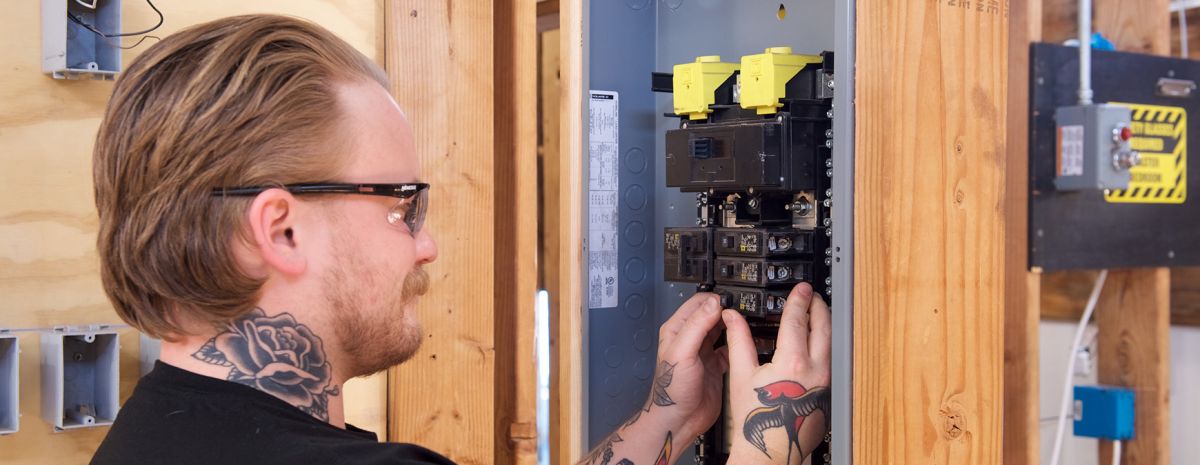
Are you interested in a trade career but not sure which trade you should choose?
The good news is you have options. And The Refrigeration School offers more than HVAC/R programs.
Are you interested in both HVAC and electrical applications but not sure what is the difference between the two? You are not alone. First, let’s look at what an HVAC technician and electrician do.
What Does an HVAC Technician Do?
HVAC technicians install and maintain heating, ventilation, cooling, and refrigeration systems that control the temperature and air quality in buildings, according to the U.S. Bureau of Labor Statistics.
HVAC technicians typically do the following:
Get Started on the Path to a New Career
Fill out our form to learn how we can help you change your life.
- Install, repair, clean, and maintain HVAC systems.
- Install HVAC electrical components and wiring.
- Diagnose, inspect, and test HVAC systems and components.
- Discuss proper HVAC system usage with customers.
- Repair or replace worn parts as needed.
- Recommend maintenance to improve air quality and performance.
HVAC systems control the temperature, humidity, and air quality in both residential and commercial buildings. Refrigeration systems help grocery stores, warehouses and food distributors store and transport food, medicine, and other perishable items.
What Does an Electrician Do?
Electricians install, maintain, and repair electrical power, lighting, and control systems in residences and commercial buildings, according to the U.S. Bureau of Labor Statistics. Electricians typically do the following:
- Read schematics, blueprints, and technical diagrams.
- Install, maintain, and repair wiring, control, and lighting systems.
- Diagnose and inspect electrical components.
- Identify electrical problems using testing devices.
- Replace wiring, equipment, and fixtures using both hand and power tools.
- Follow building regulations based on the National Electrical Code (NEC).
What is the Difference Between an HVAC Technician and Electrician?
Both HVAC technicians and electricians will learn about the fundamentals of electricity and electrical wiring during a complete curriculum at RSI. Plus, they will both get hands-on training to put classroom theory to the test in real world scenarios. However, while there is some overlap between the trade professions, there are some differences as well.
Program Duration
An HVAC technician program can be completed in as little as 6 months, attending full-time. An Electrical Applications program can be completed in as little as 7 months. Either way, both are quicker than many 2-year programs and will quickly prepare you for an apprenticeship in your chosen trade.
Job Duties
The main difference is that electricians focus on the wiring within a structure, whereas an HVAC technician will focus on the heating, ventilation, and air conditioning.
Each trade professional will study blueprints and schematics of building structures but focus on different electrical components and systems within the structure.
Job Tools
Many of the tools that each trade professional uses are unique to their trade. HVAC technicians not only use standard tools, but they will also use pipe cutters, carbon monoxide detectors, and combustion analyzers.
Electricians, on the other hand, will use tools like wire strippers, cable cutters, voltmeters, and circuit breaker finders.
Safety Procedures
While both trade professionals must adhere to strict safety procedures outlined by the National Electrical Code and OSHA, HVAC/R professionals must also get an EPA 608 certification because they will handle refrigerants that are dangerous and hazardous.
What trade are you interested in? Do you want to work on HVAC and refrigeration systems or focus your career on electrical applications? Let The Refrigeration School prepare you for either trade profession with our complete curriculum with plenty of hands-on training to prepare for your apprenticeship.
How Do You Become an HVAC Technician or Electrician?
A great way to become a trade professional is by attending a trade school like The Refrigeration School. RSI has trade programs in both HVAC and Electrical Applications.
Refrigeration Technologies
The 6-month refrigeration and HVAC training program trains and prepares you for entry as service and maintenance technicians in jobs that utilize technologies employed in the fields of heating, ventilation, air conditioning, and refrigeration (HVACR).
Electro-Mechanical Technologies
This 9-month program provides training based on a broad range of knowledge in electrical and mechanical technologies, along with heating, ventilation, air conditioning and refrigeration.
Electrical Applications
The 7-month Electrical Applications program at RSI trains you in the fundamentals of electricity. These fundamentals include mechanical and electrical principles, residential and commercial wiring applications, voice, video, and data cabling systems, and the application of motors, lighting, devices, and various types of transformers. You will receive a Diploma after successfully completing this program.
Contact us to learn more about becoming an electrician, HVAC technician or welder today.

